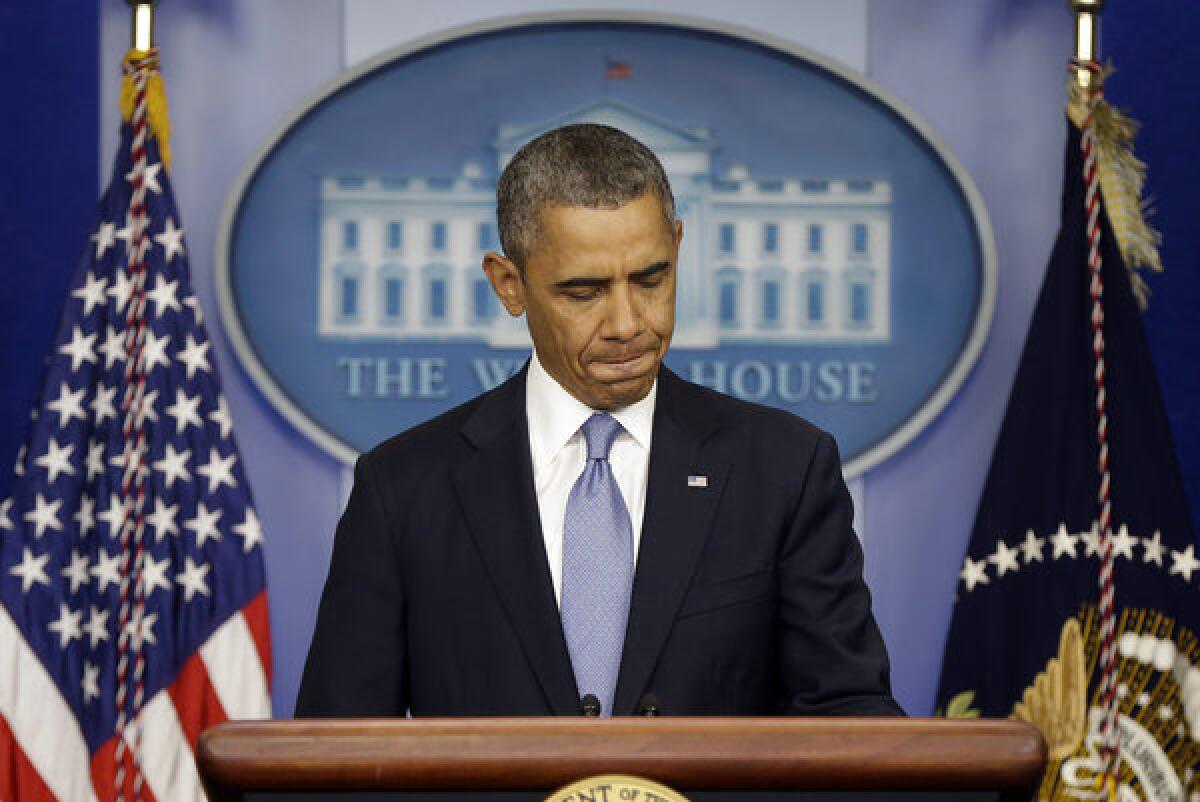Obama’s reelection did little to ‘break the fever’ in Washington

- Share via
WASHINGTON -- Around this time last year, President Obama was entering the final stretch of his reelection campaign and repeating a key rationale for a second term: Keeping him in the White House would chasten Republicans and end the dysfunction in Washington.
His reelection would prompt self-reflection, he said. It “might break the fever,” Obama told Rolling Stone magazine last year. For the campaign, the message was a way of connecting his reelection effort to his 2008 election bid. Even as an incumbent boxed in by the opposition, Obama was still promising to bring change to a broken government.
Now, several months into his second term, with Washington on the cusp of the first government shutdown since 1996, the fever of brinkmanship has spiked.
Whether the president’s thesis misjudged his opponents or was merely wooing supporters with wishful thinking is an open question.
PHOTOS: 2013’s memorable political moments
Even as Obama campaigned on the notion, few in Washington agreed with the president’s analysis. The 2012 election never looked like a power-shifting election, and it wasn’t. Republicans lost a handful of seats but easily maintained their majority in the House. The Democratic majority in the Senate grew only slightly. The balance of power remained the same, and for the most part so did the politics.
If there has been change during Obama’s second term, it is largely that the sides have hardened their positions in the ongoing budget battle. The White House has said it is ending its practice of negotiating with Republicans over raising the debt limit, something it did at length with House Speaker John Boehner (R-Ohio) in 2011. Republicans, primarily in the House, are shooting the moon, asking not merely for budget cuts or entitlement reform, as they did in the past, but for a gutting or delay of the president’s chief legislative legacy: the healthcare law.
“I think if they learned anything out of the 2011 debt limit debacle it’s that they couldn’t negotiate with hostage takers,” said Jim Manley, a former top aide to Senate Majority Leader Harry Reid (D-Nev). “That Speaker Boehner, when push comes to shove, couldn’t deliver his conference.” Still, Manley said he understood why lawmakers in the House weren’t cowed by Obama’s reelection.
“Put yourself in the shoes of the 70 to 80 conservatives -- the just-say-no crowd of the House Republicans -- they’re thinking, I won my election. So where’s the shift?” Manley said.
To be sure, the White House did emerge from the election with some momentum and quickly racked up what some Democrats deemed a victory: The year-end budget deal forced Republicans to agree to raise income tax rates, though at higher income levels than Obama wanted. But the inclination toward compromise fizzled fast. Later attempts to block automatic, across-the-board spending cuts went nowhere.
What shuts down in a government shutdown
After two years of divided government, the parties appear to have settled the easiest stuff and left no room for compromise. In fact, the 2012 budget deal led to another change that has moved the sides farther apart. Boehner emerged with less credibility among conservatives in the House, putting him in the position of either bending to their will or risk losing his leadership post.
In that sense, Obama’s campaign argument was rooted in mere hope that the center of the Republican Party would hold against a conservative wing, even as Democrats on the Hill argued otherwise.
“I believe that if we’re successful in this election, when we’re successful in this election, that the fever may break, because there’s a tradition in the Republican Party of more common sense than that,” Obama said at a Minneapolis fundraiser in June 2012.
Nearly a year and a half later, the White House has come up with little new rhetoric. Asked about the president’s fever theory, White House spokesman Jay Carney said the president was still hoping.
“He hopes and believes that, you know, common sense will prevail and that we can get about the business of reaching reasonable compromise when it comes to our budget priorities,” Carney said.
Follow Politics Now on Twitter and Facebook
kathleen.hennessey@latimes.com
Twitter: @khennessey
More to Read
Sign up for Essential California
The most important California stories and recommendations in your inbox every morning.
You may occasionally receive promotional content from the Los Angeles Times.














